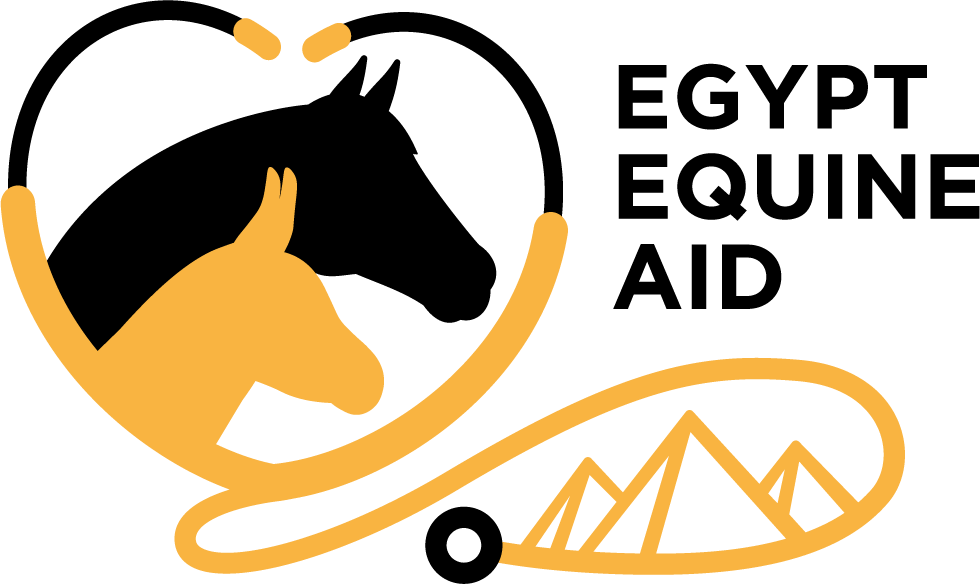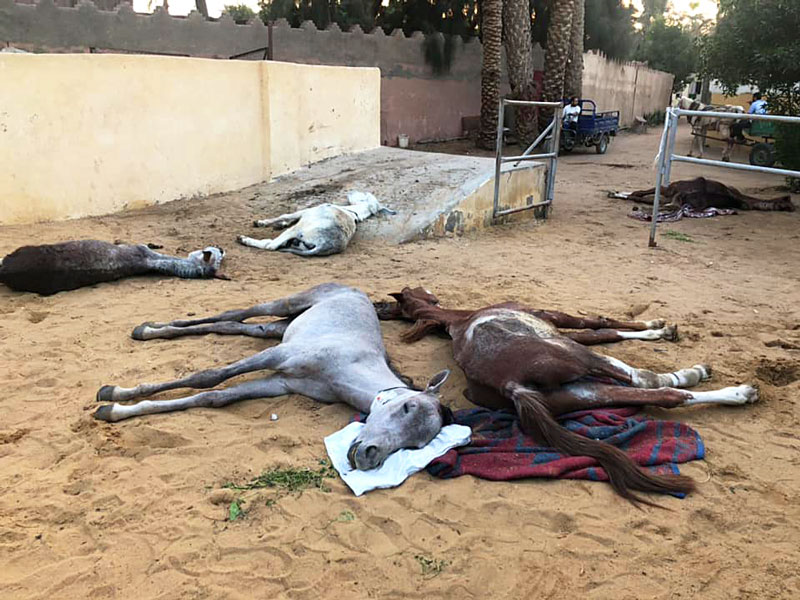The tourism industry in Egypt is one of the most vital sectors for the country’s economy, drawing millions of visitors each year to marvel at ancient wonders such as the Pyramids of Giza, the Sphinx, and the temples of Luxor. However, behind the grandeur of these historical monuments lies a darker side of tourism—one that involves the exploitation and abuse of animals, particularly horses, donkeys and camels. These animals are often used for carrying tourists on gruelling treks in the hot desert sun, with little to no access to proper food, water, or medical care. The mistreatment of these animals has been a longstanding issue, but Egypt Equine Aid’s mission is to bring about change.
The plight of animals in Egypt’s Tourism Industry
In Egypt, horses, donkeys and camels are commonly used as working animals, particularly in the tourism industry. These animals are often seen pulling carriages or carrying tourists up steep paths to visit historic sites. The conditions under which they work are frequently harsh and inhumane. Many animals suffer from malnutrition, dehydration, overwork, and a lack of veterinary care.
One of the most significant issues is that these animals are often forced to work in extreme heat without adequate access to water. Temperatures in Egypt can soar to over 40°C (104°F), and without sufficient hydration, animals can quickly become dehydrated and suffer from heatstroke. Despite their visible distress, these animals are often pushed to continue working by their owners.
Moreover, many of these animals are not given the proper rest between work shifts. They are often forced to carry heavy loads or pull carriages for hours on end, leading to severe physical exhaustion. This constant strain on their bodies can result in chronic injuries, lameness, and other long-term health issues. The lack of proper nutrition only exacerbates these problems, as the animals do not receive the necessary nutrients to maintain their strength and health.
The living conditions of these working animals are often deplorable. Many are tied up for long periods without the opportunity to move freely or lie down comfortably. In addition, the equipment used, such as harnesses and saddles, are often ill-fitting and causing painful sores and injuries.
The role of Egypt Equine Aid
One of the key services provided by Egypt Equine Aid is emergency care for animals that are in critical condition. Many animals brought to the clinic suffer from severe injuries, dehydration, malnutrition, and infectious diseases. The dedicated team of veterinarians and vet nurses work tirelessly to stabilise these animals and provide them with the treatment they need to recover. This can include wound care, rehydration, nutritional support, and medication to treat infections or other health issues. If necessary, we also perform humane euthanasia when equines are beyond saving.
In addition to emergency care, Egypt Equine Aid also offers preventive services, such as health checks, deworming, and farrier work. These services are crucial in helping to maintain the long-term health of the animals. By addressing these issues proactively, we help reduce the overall suffering of working animals in the tourism industry. We provide training and education to owners on topics such as proper nutrition, hydration, and humane working practices.
Ongoing challenges and obstacles
Egypt Equine Aid faces numerous challenges in its work. One of the biggest obstacles is the deeply ingrained cultural practices and economic pressures that drive the exploitation of animals in the tourism industry. There are thousands of working animals in Egypt, and Egypt Equine Aid has limited resources to reach them all. We rely on donations and volunteer support to carry out our work, and there is always a need for more funding and resources to expand our reach.
Furthermore, there is a lack of animal welfare laws in Egypt. This lack of accountability makes it difficult to bring about meaningful change on a larger scale.
The Path Forward
Ending the abuse of animals in Egypt’s tourism industry will require a multifaceted approach that addresses the root causes of the problem. This includes continuing to provide vital veterinary care to animals in need, but also expanding efforts to educate owners and the broader community about the importance of animal welfare.
One potential solution is the promotion of alternative forms of tourism that do not involve the exploitation of animals. Especially, tourists exploring Egypt’s historical sites on foot or by bicycle, rather than on horseback or by donkey. This would not only reduce the demand for working animals but also promote a more sustainable and eco-friendly form of tourism.
Another important aspect of the path forward is advocacy for stronger enforcement of animal welfare laws in Egypt. This will require collaboration with government authorities, local communities, and international organisations to ensure that laws are upheld and that violators are held accountable. Increased awareness and pressure from the international community can also play a role in encouraging the Egyptian government to take action on this issue.
The abuse of animals in Egypt’s tourism industry is a complex and deeply rooted issue, but Egypt Equine Aid is making a significant impact in addressing it. We are dedicated to providing veterinary care, educating owners, and advocating for better animal welfare practices. While there is still much work to be done, the progress made so far is a testament to the power of compassion, education, and collective action in bringing about positive change.
By supporting Egypt Equine Aid, we can all play a role in ending the abuse of animals in the tourism industry and ensuring that Egypt’s equines are treated with the dignity and respect they deserve.

